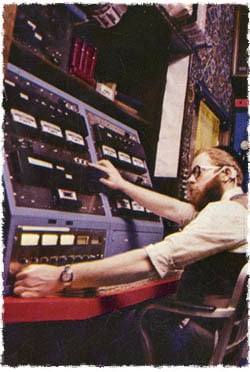With a passion for the latest technological gadget, Rabbi Yosef Yitzchok Kazen, or "YY" as he was affectionately known, always learned on the job. But he had an even greater passion—spreading Judaism. These two passions worked hand in hand when he founded the very first website dedicated to teaching Judaism.
Kazen's work continued the legacy of his grandparents and parents, who were active in spreading Judaism in the Soviet Union. They, too, had to resort to finding innovative methods to keep the flame of Judaism alive despite the regime's determination to quash all religious activity. They were trained to keep their Judaism in hiding, all while actively spreading Judaism and opening underground Torah schools.
Years later, while enjoying the benefits of full freedom of religious expression, YY used innovation to reach Jews unreachable via the conventional methods widely available at the time.
Acclimating to the Midwest

In 1953, Rabbi Zalman and Shula Kazen arrived from the Soviet Union, via Paris, in New York City together with their six daughters,
"My mother was overjoyed when she arrived in New York; she had never seen so many Jews in one place," says Henya Laine, who now resides in Brooklyn, New York. "For her to now experience Judaism being practiced in the open was a phenomenal experience,"
"The Joint told my parents that there was no room for a large family like ours in New York," continues Laine. "They said they would have to relocate to Cleveland, Ohio."
"Who knew where Ohio is?" was Shula's reaction... It was only after the Rebbe's encouragement that the family moved there.
Yosef Yitzchok Kazen, born in 1954, was their first boy, and the only one of their seven children. He was named after the sixth Lubavitch Rebbe, Rabbi Yosef Yitzchok Schneersohn, of righteous memory.
Rabbi Zalman was later appointed to the position of rabbi of Congregation Tzemach Tzedek. Their home in Cleveland was, and to this day is, a home of Torah learning and assistance to the local Russian community. Rabbi Zalman, 90, and Rebbetzen Shula, 86, are still very active in the Jewish community and the congregation's activities.
A Prodigious Youth

Young Kazen studied in the Cleveland Kaliver Yeshivah and the Hebrew Academy. He later went to learn in New York and Brazil. For high school, at the Rebbe's suggestion, he went to learn in the Telshe ("Telz") Talmudic Academy in Cleveland, where he excelled in his studies and was beloved by his fellow students. He later reminisced how Rabbi Mordechai Gifter, the dean of the Telshe Academy, would deliver lectures based on the teachings of the Rebbe, Rabbi Menachem Mendel Schneerson, of righteous memory. According to Kazen, some of the Rebbe's voluminous teachings sat on Rabbi Gifter's office bookshelf.
"After Yosef's learning in school, he would come home and learn with his father," says Laine, "especially Chabad philosophy and the Rebbe's teachings, which gave him direction and purpose."
"He always deeply contemplated the meaning and purpose of life," says his sister Rochel Goldman, who is a Chabad-Lubavitch emissary in Johannesburg, South Africa.
It was also in Telshe that Kazen organized a group of students to learn Chabad philosophy with his father.
Emulating his parents and grandparents, Kazen always was ready to assist another Jew do a Mitzvah. He particularly enjoyed riding on "Mitzvah Tanks"; he was always looking out to do something good and to help those that may have been sidelined.
After studying at the Central Lubavitch Yeshivah in Brooklyn, New York, he married his wife Rochel. Together they had six children: Raizy, Michoel, Shmuel, Choni, Peretz and Sarah.
"He was a wonderful father," says Laine, "he would always tell them stories on the way to the synagogue. His children would sit next him so quietly and respectfully."
Kazen also made sure to always take his kids with him when he visited different Chabad Houses in the New York area to assist them in their activities.
"He read a lot on how to raise children," says Goldman, "he had an amazing philosophy."
Technologically Savvy

Already as a student in the Central Lubavitch Yeshivah, Kazen became involved in the technological aspects of the live international telephone hook-ups that would broadcast the Rebbe's public talks, and was also involved in recording the Rebbe's talks.
"He worked diligently," says Chaim Baruch Halberstam, director of WLCC, the organization that would record the Rebbe, "to restore the archives of the vintage recordings of the Rebbe's earliest talks."
"He always had every new gadget," says his wife Rochel. "The children also always had every new gadget..."
In the early eighties the Kazens had a computer in their home and Yosef, who did administrative work in United Lubavitch Yeshivah, computerized their entire operation at the school.
"I always liked to play with modern technology," said Kazen at a work shop at the Chabad-Lubavitch International Conference of Emissaries in 1995. "I got to use the computer in yeshiva, I streamlined a lot of work in the office, and once you do that, you twiddle your thumbs, because you do not know what to do..."
So Kazen hooked up a modem and found out about online bulletin boards on Fidonet. There he started interacting with other Jews and immediately foresaw the potential of spreading Judaism.
"He always wanted to be a Shliach," says his wife, referring to the Hebrew term for Chabad-Luabvitch emissary, "he just never found his niche. With the computer he found his mission and dedicated his life to it."
"He never sat back complacent." says Goldman. "Whatever was happening in the world fascinated him. He felt G‑d was making all this technology accesible for the purpose of disseminating Torah and Judaism."
A Personal Connection

"I think the good part about the Net," Kazen told Jeff Zaleski, author of the Soul of Cyberspace, in 1997, "is that it allows for people to sit on their own, read, study, question, ask, ask, and ask—until they're comfortable enough. That's what I have found to be the power of [the Internet]."
Kazen made it a priority to respond to every individual. Kazen told Jeff Zaleski that he spent an average of six hours a day responding to questions.
"He would respond to every single person," says his wife. "He would not listen to those who suggested that he needn't respond to some of them immediately."
Jim Boehije was one such person. After his son died, he e-mailed 'Ask the Rabbi' on Chabad.org for advice in his situation. He did not expect a quick response, "but by the early morning," he says, "I checked my e-mail, and there was a ray of hope—a friendly voice advising, consoling."
"YY set the tone for Chabad.org today," says Rabbi Tzvi Freeman, team leader for Chabad.org's Ask the Rabbi, today with fifteen scholars logging in to answer questions. "You don't answer questions, you answer people. To YY a question was a tug on the end of his fishing line. You've found a node out there who wants to connect.
"So now you find out why is this guy asking this question? Where does s/he need to go? What does s/he want and how can I help? It's a whole other game. It's called 'getting to know you.'"
He was dedicated to every single person who wrote to Chabad.org. His last months in a New York hospital prior to his untimely death in December, 1998, was a testament to his love for people as individuals.
"When he was in the hospital," says his brother-in-law, Rabbi Moshe Kotlarksy, vice chairman of Merkos L'Inyonei Chinuch, the education arm of Chabad-Lubavitch, "he was still answering the questions and e-mails he received on Chabad.org."
Since he was supposed to rest, "he would keep his computer underneath his bed,", recalls his nephew Rabbi Mendy Kotlarsky. "When Rochel was gone he would tell us to go out to the hall and make sure that she had left the floor—and then he would pull it out."
"This is what makes me happy," Kazen told his nephew as he opened the laptop.





Join the Discussion